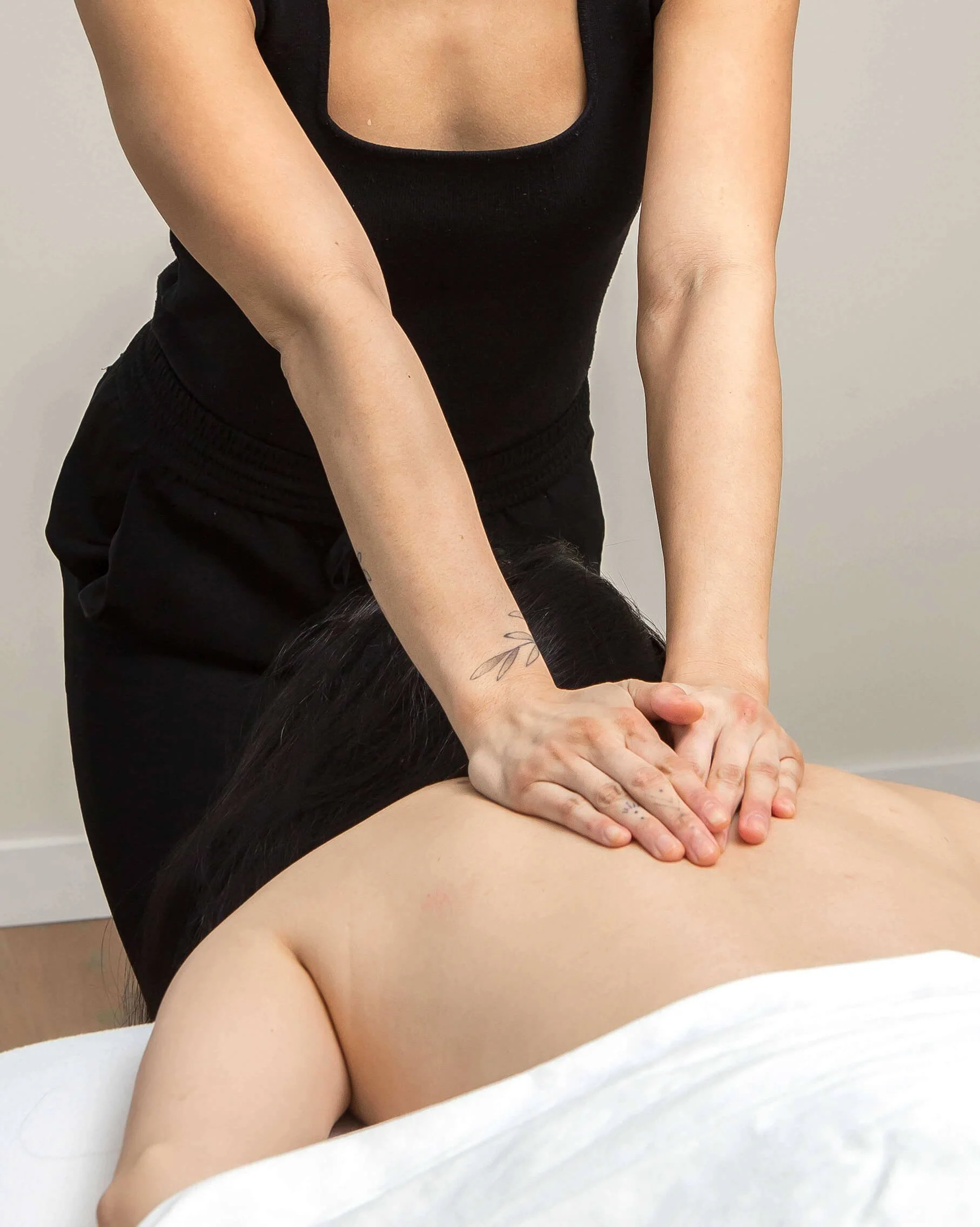Deep Tissue Massage | Uncover Relief & Relaxation in Vancouver
Are you plagued by persistent muscle tension, restricted mobility, or debilitating headaches? The strains and stresses of daily life, from lifting to bending and turning, can take a toll on our bodies and cause muscle strain and discomfort.
But there's a potent solution beyond surface-level relaxation—why not book an appointment at West End Wellness in downtown Vancouver for a deep tissue massage?
At West End Wellness, we understand that a true solution lies beneath the surface. Unlike traditional relaxation massages, deep tissue massage specifically targets the deeper layers of muscles and connective tissues.
This makes it ideal for addressing soft tissue dysfunctions stemming from sports-related injuries and the aches and strains caused by everyday activities like work, lifting, and gardening. Our team of registered massage therapists has honed their skills to provide unparalleled relief and revitalization.
Benefits of Deep Tissue Massage Therapy:
Deep tissue massage therapy is a popular treatment that addresses muscle pain, tension, and stiffness by applying sustained pressure using slow, deep strokes to target the inner layers of your muscles and connective tissues. Here are 10 health benefits associated with deep tissue massage therapy:
Reduces Chronic Pain: It helps alleviate chronic pain by increasing blood flow throughout the body, thus reducing inflammation that causes pain. Deep tissue massage therapy can be particularly effective for conditions like fibromyalgia, arthritis, and lower back pain.
Improves Blood Pressure: Regular deep tissue massages have been shown to reduce high blood pressure by promoting relaxation and reducing stress levels, which can positively affect blood pressure readings.
Breaks Down Scar Tissue: Over time, deep tissue massage therapy can help break down and eventually erase scar tissue in the body. This improves flexibility and range of motion and decreases discomfort associated with scar tissue.
Relieves Stress: Deep tissue massage can significantly lower stress levels by reducing the production of the body's stress hormones while boosting mood through the increase of serotonin and oxytocin levels.
Enhances Muscle Recovery: Athletes and active individuals can benefit from deep tissue massages, as they help loosen muscle tissues, release toxins from muscles, and get blood and oxygen circulating properly, which aids in the recovery of muscles and tissues.
Increases Joint Mobility: By working on connective tissues, muscles, and tendons, deep tissue massage can increase the mobility and flexibility of joints, reducing pain and improving function.
Reduces Anxiety and Depression: The calming effect of deep tissue massage therapy can help reduce symptoms of anxiety and depression by promoting relaxation and well-being.
Improves Posture: By relieving muscle tension and stiffness, deep tissue massage can help correct poor posture by realigning the body’s muscles and connective tissues.
Helps with Labor Pain and Delivery: For pregnant women, deep tissue massage has been noted to help reduce labor pain and delivery time. It can also reduce the need for pain medication during childbirth.
Promotes Better Sleep: The relaxation and pain relief provided by deep tissue massage therapy can lead to better sleep patterns. It can help those suffering from insomnia by facilitating the release of serotonin, which is a natural precursor to melatonin, the hormone that regulates sleep.
Deep tissue massage therapy offers a wide range of benefits, from improving physical health issues like chronic pain and muscle recovery to enhancing mental well-being by reducing stress and improving sleep quality.
However, it's important to consult with a healthcare provider before beginning any new massage therapy, especially if you have underlying health conditions.
Who Can Benefit from Deep Tissue Massage?
Virtually anyone can reap the rewards of deep tissue massage therapy. Whether you're an athlete, endure strenuous physical training, or are confined to prolonged periods of sitting, our registered massage therapists can provide tailored treatment.
Deep tissue massage therapy is a versatile treatment that can benefit a wide range of individuals, from those experiencing specific health issues to athletes and even those looking to reduce stress and improve overall well-being. Here's a look at who can benefit from deep tissue massage:
| Who Can Benefit | Benefits of Deep Tissue Massage |
|---|---|
| People with Chronic Pain | Alleviates tension, reduces inflammation, and helps manage conditions like fibromyalgia and chronic back pain. |
| Athletes and Physically Active Individuals | Improves recovery, flexibility, and performance; reduces muscle soreness. |
| Those Suffering from Muscle Tension and Stiffness | Breaks down knots and relieves muscle tension in areas like the neck, shoulders, and legs. |
| Individuals Recovering from Injuries | Aids in recovery by reducing scar tissue and increasing range of motion. |
| People with High Stress Levels and Anxiety | Promotes relaxation, reduces cortisol levels, and enhances mental well-being. |
| Individuals Experiencing Poor Posture | Helps realign the body's muscles and connective tissues, improving posture and reducing pain. |
| Pregnant Women | Manages labor pain and discomfort associated with pregnancy, with proper modifications. |
| People with High Blood Pressure | May help lower blood pressure by promoting relaxation and decreasing stress levels. |
| Anyone Looking to Improve Sleep | Reduces pain, eases muscle tension, and promotes better sleep quality. |
| Individuals with Limited Mobility or Flexibility | Enhances flexibility and range of motion by working on connective tissue and improving circulation. |
While deep tissue massage offers numerous benefits, it's important for individuals with certain health conditions, such as acute injuries, skin diseases, blood clotting disorders, or cardiovascular diseases, to consult with a healthcare professional before undergoing massage therapy to ensure it's safe and appropriate for their specific health situation.
What to Expect During a Deep Tissue Massage
Before your deep tissue massage, you can first expect your massage therapist to want to get to know more about you and your problem areas. The reason is so they can know whether to treat your entire body or a specific area.
During your deep tissue massage session, our skilled therapists employ a combination of strong squeezing, pressuring, and kneading movements. You will be asked to lie on your back or stomach under sheets. It will be important for you to be undressed to your comfort, but the areas you will be looking to work on must be exposed.
While each deep tissue massage may differ, your treatment will always start by warming up the muscles and encouraging you to relax. These techniques encourage the release of acids, toxins, and other waste products trapped within muscles and tissues. While the experience may entail discomfort, it's a safe and effective way to address deep-seated tensions. When working on your problem areas, you are welcome to let your therapist know so they can vary the amount of pressure.
Navigating Your Deep Tissue Massage Experience
Prepare for Discomfort: The pressure and techniques employed during a deep tissue massage can be more intense than those of a traditional massage. Some discomfort is normal as we target deep-seated tensions.
Post-Treatment Muscle Soreness: Following your deep tissue massage, you may experience muscle soreness that typically subsides within a few days. This discomfort is a sign that your body is rejuvenating and healing.
Personalized Experience: You're in control of your deep tissue massage experience. Communicate your preferences, and our therapists will tailor the depth, intensity, and frequency to maximize the benefits for your unique body.
Stay hydrated: Deep tissue massage triggers the release of toxins, and hydration is essential for flushing them out of your system. Aim for a steady intake of water throughout the day.
The Holistic Approach at West End Wellness
Our commitment to your well-being extends beyond the massage table. At West End Wellness, we adhere to a comprehensive approach encompassing assessment, treatment, prevention, and home maintenance.
Our registered massage therapists employ various functional and palliative assessment techniques to ensure progress is measurable and administered effectively. To enhance your mobility and stability, we recommend therapeutic exercises as part of your home recovery regimen, complementing the benefits of deep tissue massage.
Frequently Asked Questions About Deep Tissue Massage
Q: Are deep tissue massages painful?
Deep tissue massages, targeting deeper muscle layers, can cause discomfort or mild pain due to firm pressure and slow strokes. Discomfort levels vary by individual tolerance and treatment areas. Effective communication with your therapist ensures comfort. Post-massage soreness is common but usually fades, leaving relief and improved mobility.
Q: How often is it safe to get a deep tissue massage?
The optimal frequency for deep tissue massage varies by individual needs and health. Typically, every 2 to 4 weeks is recommended for chronic pain relief, while athletes may benefit from weekly sessions for recovery and injury prevention. Always consult a professional to tailor a schedule to your specific wellness goals.
Q: How many days does it take to recover from a deep tissue massage?
Recovery from a deep tissue massage typically takes 1 to 3 days, with individuals experiencing mild soreness similar to post-workout discomfort. Hydration, warm baths, and gentle stretching can aid in recovery. Persistent or severe soreness beyond a few days should prompt consultation with a healthcare provider to address any concerns.
Q: Can you feel bad after a deep tissue massage?
Feeling unwell after a deep tissue massage, such as experiencing soreness, fatigue, or mild nausea, is possible due to the body releasing toxins. Drinking water and resting usually help alleviate these symptoms. Persistent discomfort should be discussed with a healthcare provider and your therapist for future session adjustments.
Let us be your partner in health and well-being.
Take the first step on your journey to optimal health and wellness. Book an appointment with one of our practitioners today. We are here to help you achieve your health goals, reduce pain, and improve your quality of life.
For any questions, or concerns, or to schedule an appointment, feel free to contact us at:



